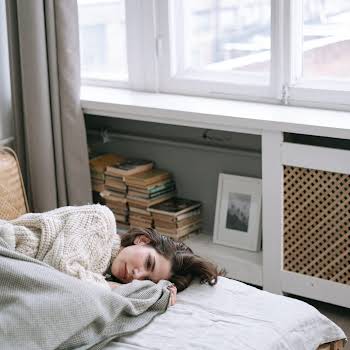‘I wee myself’: Claire Fullam breaks the taboo on female urinary incontinence
By Grace McGettigan
13th Mar 2020
13th Mar 2020
Urinary incontinence affects far more women than you’d think. We caught up with Irish mum, Claire Fullam (AKA Instagram’s Claire Balding) and pelvic health expert Helen Keeble to learn more about the impact of bladder leaks on everyday life, as well as how to reduce them
Do you pee when you laugh or sneeze? Do you find yourself having unexpected bladder leaks in your underwear and clothes? You’re not the only one. Almost 70% of women in Ireland have wet themselves at some stage – and yes, it can happen to us at any age.
“I don’t get why we don’t speak about it,” says Claire Fullam, an Irish mother who has experienced urinary incontinence for years. Speaking at the Always Discreet #WeeNeedToTalk lunch in Dublin, she said, “Every time I talk about something that’s embarrassing – which is 90% of the time – it’s so liberating. It’s so nice to just go, ‘do you know what, this is what’s happening to me’ – and have someone else say, ‘me too’. It starts a conversation, and I don’t understand any other way to live. It’s just the way I am.”
With this no-holds-barred attitude, Claire is determined to break the silence on bladder leaks and ditch the taboo. “I know people are embarrassed, nervous or a bit scared [to talk about it],” she says, “especially with their friends. Sometimes the closest people to you, their judgement means more than anyone else’s. But actually, when you do [talk about it], it’s the most liberating thing.”
There’s no need to be ashamed of something that happens to so many of us. It’s important to get chatting and let each other know that we’re all in the same (leaky) boat.
‘I wee myself’
“I wee myself a lot,” Claire told the group in Dublin. “I always have. When I was a teenager, my friends and I would be like, ‘oh no’. We’d just be really giddy and someone was going to wee. It was just giddiness. But then as I got older, I thought, “Sh*t, I’m not even giddy right now and this is happening. No one is even making me laugh.”
Urinary incontinence – or urinary leakage – comes in various ways. For some women, it’s called ‘stress incontinence’, and this involves a bladder leak when they laugh, sneeze, cough or exercise. For others, it’s called ‘urge incontinence’, which involves a strong urge to pee and not making it to the loo on time. Both of these are very common – but they don’t have to be.
Simple exercises called ‘pelvic floor exercises’ can significantly reduce the frequency of leaks (and in some cases, stop them altogether). The exercises strengthen your pelvic floor muscles, and as a result, you become better able to control your urine and make it to the loo on time. The best part is, these exercises can be done easily at home, in work, on the bus, or even in the queue for your morning coffee.
However, research by Always Discreet found only 6% of us are doing the recommended pelvic floor exercises every day.
How do I do pelvic floor exercises?
Helen Keeble, a pelvic health expert and physiotherapist, says, “We used to get told to imagine you’re stopping [the flow of] urine. But actually, we have done lots of research, and because of the anatomy and where the pelvic muscles are, we actually have to imagine that we’re stopping wind.
“You still have to get a tightening and a lift,” she says, “but it has to be from your bum hole and not the urethra, which is where the urine comes out from. You have to focus on [clenching and releasing] the back passage; nothing else should move,” she says. That means you shouldn’t be clenching your thighs, tummy or vagina – just your bum hole. “The rest of your body should stay nice and still and relaxed.”
Helen adds that this technique is proven, with seven out of 10 women no longer having leaks just by doing these squeezes. “If you are having leaks, you should be aiming for about 25 to 30 squeezes a day to begin with. You’ll have to do them for a few months to see any big changes.
“And it’s never too late,” she says. “No matter how long it’s been going on, no matter how bad it is, just do the squeezes and after a few months, [the leaks] should get less [frequent].”
If anyone is unsure of how to do pelvic floor exercises, Helen recommends making an appointment with a pelvic floor physiotherapist who will be able to guide you and track your progress.
Impact on a woman’s life
Urinary incontinence can have a profound impact on women’s lives. Depending on how severe your leaks are, it can restrict the clothes you wear, the type of exercise you do and even the way you socialise. One woman at the #WeeNeedToTalk event said she wants to be able to use a trampoline again. Another said she misses wearing lycra shorts, while others said they wish they could leave the house without having to bring a change of clothes and sanitary products.
Bladder leaks can also impact a woman’s relationships; with the fear of leaking causing her to avoid sex or intimacy.
This doesn’t have to be the case.
With simple pelvic floor exercises proven to reduce leaks (and in some cases stop them altogether), there’s no reason for any of us to be living in discomfort or embarrassment. We’re all more alike than you’d think, and the more we talk about what we’re going through and the remedies available to us, the freer, happier and drier we’ll be.
Feature photo: Claire Fullam (@claire_balding on Instagram)
Read more: UTIs explained: 23 burning questions about urinary tract infections
Read more: PMS: It’s time to start talking about premenstrual syndrome
Read more: Do you have IBS? Dr Megan Rossi shares 5 lessons about gut health























